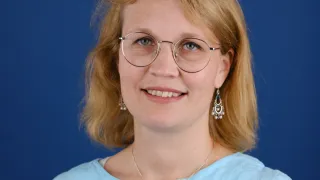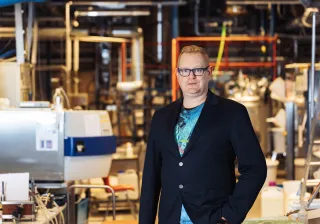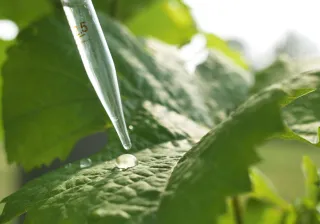In the field of biotechnology, new, even more sustainable materials and chemicals are being developed for various industrial sectors. VTT is building upon its expertise in biotechnology by inviting Yvonne Nygård to serve as Research Professor beginning on 1 September 2023. According to Nygård, the focus of biotechnology research must be shifted even more towards production processes.
Rapid changes in society mean that the production of materials will look very different in the future than it does today. Solutions developed in biotechnology research must be put into practice, such as in the production of plastics and industrial chemicals. The circular economy is a vital factor in steering development: Materials can no longer be used only linearly - recycling must be taken into account in development from the outset.
“In addition to the production of materials and chemicals, biotechnology also offers new, more sustainable solutions, such as for food production. Cellular agriculture is definitely on the rise, and there is an enormous amount of interest in the production of proteins and fats. The question is how to produce as much as possible with as little as possible,” explains Nygård.
Process perspective emphasised - production chains must be updated
With regard to biotechnical production, research has thus far placed an emphasis on how chemicals and materials needed in industry can be replaced with more sustainable alternatives. Industrial production has restricted development, when new solutions have been introduced as part of processes that have evolved for decades in, for example, the petroleum sector.
Nygård is now calling for a broader perspective when it comes to biotechnology development. Raw materials and substrates, which can be used to build a more sustainable process as a whole, must be found. The process itself must be optimised so that it is efficient and does not consume too much water or energy.
“Many of the processes in use right now might be functional, but they’re not sustainable. That’s why they have to be updated, even though this is anything but a simple task,” says Nygård.
Artificial intelligence solutions under scrutiny - society evolving together
According to Nygård, artificial intelligence will revolutionise biotechnology. The structure and function of microbes are extremely complex, and massive amounts of data on their properties are already being collected. Artificial intelligence solutions are playing an increasingly important role in the processing and interpretation of this data.
“With artificial intelligence, knowledge can be put to more effective use, and microbes and processes can be developed in even better ways,” explains Nygård.
There is also a greater emphasis on cooperation with other scientific and research fields. “Biotechnology, chemistry and process technology all go hand in hand. You can’t solve problems on your own - we have been working very closely with other fields on what kinds of solutions we want to put forward in society together.”
Innovative biotechnology research being conducted at VTT
Nygård is joining VTT from the Chalmers University of Technology in Gothenburg, Sweden, where she serves as Associate Professor. Prior to this, Nygård did her post doctoral research at the University of Groningen and DSM in the Netherlands.
In her research, Nygård has focused on how more efficient biotechnical production organisms and processes can be developed and, for example, how materials and chemicals made from fossil raw materials can be replaced with biomass, thus enabling the manufacture of more environmentally-friendly and sustainable products. VTT is already a familiar working environment for Nygård, as she did her doctoral research here upon graduating from Aalto University in 2014.
“VTT is an outstanding place to do your doctoral work: it is a leading institution in the field and conducts top-flight research, for which there is a real need. At VTT, I can influence how biotechnology is applied in different sectors. What is most compelling for me is the way that academic and applied research are combined in my work,” says Nygård.
“Industrial biotechnology is one of VTT's growth areas. The applications in this field play a significant role, for example, in the production of new sustainable materials, food solutions, and drug development. Nygård brings a fresh perspective and strong experience, especially in the development of production processes and the application of solutions.” says Tua Huomo, Executive Vice President, Sustainable Products and Materials at VTT.





